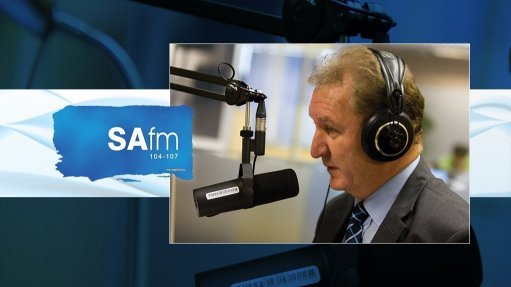Oil adulteration a big risk to South Africa’s fuel security
This article has been supplied as a media statement and is not written by Creamer Media. It may be available only for a limited time on this website.
By Mpho Dipela, Director and Shareholder of Royale Energy
South Africa is heavily dependent on imported fuel. As an oil company, Royale Energy is aware of the strategic role played by liquid fuels and have special measures in place to protect supply and logistics due to the importance of our structure within South Africa’s oil industry. The adulteration of oil in the country poses a massive new frontline security risk to fuel supply.
In June last year, the Mineral Resources and Energy department raised the alarm on diesel-paraffin mixtures being sold as diesel at some petrol stations, confirmed by samples collected. The department also noted that imports of illuminating paraffin have increased significantly over the past year. As a result, it is currently working on a marker to ensure greater traceability of paraffin in diesel.
The price of diesel at the pump is not regulated in South Africa and therefore will differ. However, the source of the product is mostly the same, being locally refined or finished product imported by the oil majors. This means that it is not uncommon to find differences in diesel pricing even in rural areas.
The price is not just dependent on the cost of crude oil, but also on domestic demand. This is because all imported diesel passes via various retail stations and depots before finally making its way onto the nation's roads. But some retailers sell the diesel at much higher margins as the product may not be 100% diesel but instead mixed with paraffin.
The addition of a liquid fuel such as kerosene or illuminating paraffin to diesel is known as adulteration. This produces an inferior quality product that can damage vehicles, reduce their efficiency and increase the emissions of harmful pollutants. Mixing diesel with paraffin to sell to unsuspecting customers is therefore illegal and service stations found with adulterated diesel could face immediate closure and prosecution.
However, the South African Petroleum Retailers Association (SAPRA) has reiterated government’s warnings about increasing instances of criminality at the pumps, reporting at least 200 cases of illicit trading since November 2020 which include diesel adulteration – especially in Limpopo and Mpumalanga.
Paraffin data further underscores the depths of the problems. According to the South African Petroleum Industry Association’s long-term sales data, which represents the major petroleum and liquefied petroleum gas companies in the country, the base consumption of illuminating paraffin in the country was roughly about 600,000 kilolitres per year. Over the past three years, however, it has doubled to reach some 1.2 million kilolitres per year.
Significantly, the number of people using paraffin for cooking and lighting has not doubled concurrently over this period. Additionally, the rise has taken place against the backdrop of an increasing number of people living in poverty, which means that we should be seeing a lower demand for this fuel.
As a result, this raises serious concerns about where all that extra paraffin is being used, pointing to increased levels of oil adulteration. The scale of the problem has now reached a critical level and needs to be addressed immediately.
The adulteration of fuels is one of the most serious problems in the country at present, impacting both environmental safety and public health. Consumers should therefore stick with trusted brands which have taken a firm stance against adulteration. Avoid the temptation of purchasing products at a price that is clearly abnormal compared to the competition.
Government’s interventions to curb this trend are also a step in the right direction, such as police investigations using a “marker” to ensure greater traceability of paraffin in diesel. These intervention markers are inserted into paraffin, and if the paraffin is mixed into diesel the markers are able to pick it up. SARS officials are now also able to use handheld devices to detect the presence of the marker.
Royale Energy takes the risk of adulteration very seriously. As a company, we are committed to ensuring that all our products meet international standards in this regard. As Royale Energy, it is our responsibility to work in accordance with the rule of law and ensure that high quality products remain on the market at all times.
Comments
Press Office
Announcements
What's On
Subscribe to improve your user experience...
Option 1 (equivalent of R125 a month):
Receive a weekly copy of Creamer Media's Engineering News & Mining Weekly magazine
(print copy for those in South Africa and e-magazine for those outside of South Africa)
Receive daily email newsletters
Access to full search results
Access archive of magazine back copies
Access to Projects in Progress
Access to ONE Research Report of your choice in PDF format
Option 2 (equivalent of R375 a month):
All benefits from Option 1
PLUS
Access to Creamer Media's Research Channel Africa for ALL Research Reports, in PDF format, on various industrial and mining sectors
including Electricity; Water; Energy Transition; Hydrogen; Roads, Rail and Ports; Coal; Gold; Platinum; Battery Metals; etc.
Already a subscriber?
Forgotten your password?
Receive weekly copy of Creamer Media's Engineering News & Mining Weekly magazine (print copy for those in South Africa and e-magazine for those outside of South Africa)
➕
Recieve daily email newsletters
➕
Access to full search results
➕
Access archive of magazine back copies
➕
Access to Projects in Progress
➕
Access to ONE Research Report of your choice in PDF format
RESEARCH CHANNEL AFRICA
R4500 (equivalent of R375 a month)
SUBSCRIBEAll benefits from Option 1
➕
Access to Creamer Media's Research Channel Africa for ALL Research Reports on various industrial and mining sectors, in PDF format, including on:
Electricity
➕
Water
➕
Energy Transition
➕
Hydrogen
➕
Roads, Rail and Ports
➕
Coal
➕
Gold
➕
Platinum
➕
Battery Metals
➕
etc.
Receive all benefits from Option 1 or Option 2 delivered to numerous people at your company
➕
Multiple User names and Passwords for simultaneous log-ins
➕
Intranet integration access to all in your organisation


















